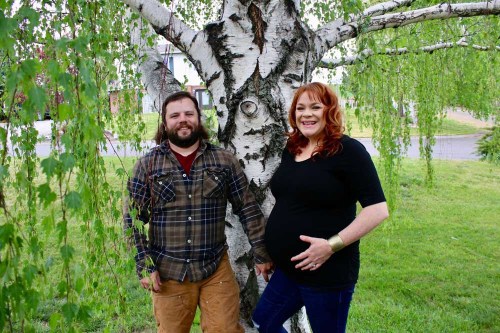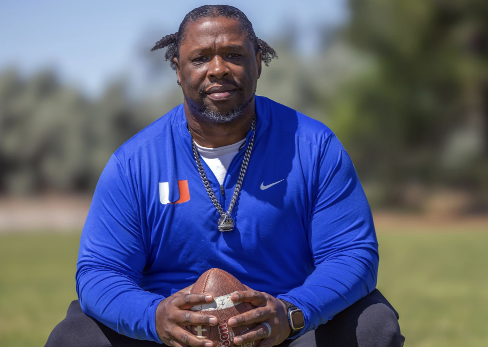Joy and grief: finally pregnant, but now there’s a pandemic
Published 3:00 pm Tuesday, April 28, 2020

- Bryan and Emily Martin of Milton-Freewater are a few weeks away from the birth of their son. Nothing is how they expected it to be, however.
MILTON-FREEWATER — In just over three weeks, Emily Martin will hold a dream more than a decade in the making.
She and her husband, Bryan Martin, endured a long journey marked by grief and uncertainty to reach where they are now — about to become parents.
“Mini Mart,” as their baby is called at the moment, is scheduled to be born May 18 at Oregon Health & Science University in Portland.
The Milton-Freewater couple travel there every four weeks because Emily has experienced placenta and cord abnormalities that put her and the baby at high risk during labor, she said.
With the COVID-19 pandemic, the couple can only hope to be in the same room when Mini Mart is born. At a recent checkup at OHSU, Emily said her husband could not accompany her into the exam room.
“Supposedly, he will be allowed at the birth,” she said.
The Martins have much company in their concerns of having a pandemic pregnancy and birth. People around the globe are expressing fears about the coronavirus with so much yet unknown about COVID-19 and no vaccination or effective treatments.
According to obstetrical staff at the Mayo Clinic, there is not yet a definitive answer to whether infected mothers can pass the virus to their babies before birth, although the Centers for Disease Control and Prevention calls the chances “unlikely.”
So far, the virus has not been detected in amniotic fluid or breast milk, according to the CDC.
But newborns can become infected with the virus by exposure to sick caregivers after delivery, the Mayo Clinic said.
If there is any question if a mother has a suspected case of COVID-19, the American Academy of Pediatrics recommends special precautions, including possibly separating mom and baby temporarily, monitoring the newborn for signs of infection and testing the newborn for COVID-19 — if tests are available.
The coronavirus is not the first hurdle in this pregnancy for the Martins.
Not only has Emily had serious medical emergencies, including a long battle with terrible infections, but she’s experienced three miscarriages in trying to begin a family.
“Getting pregnant has been extremely difficult and emotional,” she said. “And not very many people talk about this.”
The Martins realized they would need to seek medical intervention to achieve pregnancy once again, but the associated costs put such help out of reach.
In Seattle and Spokane, Washington, people have to enter a fertility clinic with a “starter” fund of about $18,000, Emily said, noting almost no health insurance plan covers any of the costs.
“You have to walk in with the money and put it down. A lot of my friends had to take out loans,” she said.
In researching solutions, however, she came across information about “CNY Fertility.”
Founded in 1997, Central New York fertility clinic is based on the philosophy that such care should be made as affordable as possible and that everyone who wants help should be able to get it.
The cost of fertility care there, even with round trip airfare, gave the couple wings.
After a six-month waiting list evaporated with another patient’s cancellation, Emily flew to Albany, New York, multiple times.
Handling the logistics of travel, cycles, paperwork, medication and timing became a full-time job on top of her already full-time career as owner of Fringe hair salon on Milton-Freewater’s Main Street.
Victory came a year ago when the clinic team was able to retrieve the eggs Emily’s ovaries had produced through medicine.
After the best resulting embryo was transferred back to her in August, however, another loss was in store.
Despite being considered the “highest quality” embryo, the implantation didn’t take, Emily said.
“And it was a girl,” she said.
The small business owner has lived through plenty of hardship in her 34 years. Her shop has been robbed, flooded and driven into since it opened in 2015. But this was a new level of devastation, she said.
“That was like my body failed me … just, as a woman,” she said.
Past trauma has taught her endurance, however, and Emily returned to New York on her next reproductive cycle.
That was September. Twelve weeks later the Martins could draw a breath and start letting people know a baby boy was on his way.
Their families were ecstatic. Celebrations were planned.
One baby shower was expected to be huge, slated to take place April 5 at Three Rivers Winery, where the couple were married.
A smaller family party was also in the works.
The threat of catching the coronavirus, of course, has wiped out all social engagements everywhere.
Emily said her sister-in-law, Kelsey Hendricks, created a virtual baby shower that was surprisingly perfect.
Guests sent gifts ahead of time, then everyone joined online at the same time a weekend ago.
“We had 40 people on ‘live,’ and some were people who couldn’t have traveled here,” Emily said.
Other plans haven’t been similarly resolved. The birthing class they signed up for is a no-go.
“People say ‘Oh, those are stupid.’ But I’ve waited so long … I’d love ‘stupid,’” she pointed out. “I read the book they sent, but I feel so unprepared.”
Creating a nursery for Mini Mart has been dispiriting, as well. With no specialty stores open to wander and collect ideas from, Emily said she’s lacked the drive to design her son’s room.
“I definitely feel depression, and that’s really not like me at all,” she said.
The pandemic world is going to shape her future, as well.
Her husband’s job is stable for now, but as a self-employed hair stylist, Emily has applied for every avenue of promised government financial help, without a positive result so far.
She tried to mitigate the state-ordered closure of nonessential Oregon businesses by serving as many clients as possible in the week before Gov. Kate Brown made the call.
Emily knew it was coming, and has a healthy fear of the consequences of violating that order, she said, citing long license suspensions.
Money made that frenetic week can’t outlast the pandemic, however.
“I feel like every day I’m home now is a day I won’t be able to stay home with the baby. Because I’ll have to go back to work,” she said.
There will be no pictures of smiling grandparents holding a tiny bundle in a hospital room. When Mini Mart gets home from OHSU, he will be available for window viewings only, Emily said.
“Our parents can’t come unless they’ve isolated for 14 days and they’ve had updated vaccinations,” she said. “Luckily, I have big windows in my house.”
There will be one more big step to enter into parenthood.
Three days before Emily’s May 18 labor induction, she and her husband will drive to Portland and be tested for COVID-19. Then they must wait for the results before being admitted to the large teaching hospital.
That means hooking up their travel trailer to head east, so they can be sure of their lodging accommodations.
Adjusting their expectations is a process for the Martins, and one that others seem unable to relate to, she added.
“I feel like people won’t allow us to be sad about this, to grieve all the things we are missing out on,” Emily said. “I feel like if anyone would have a baby in a pandemic, it would be me.”









